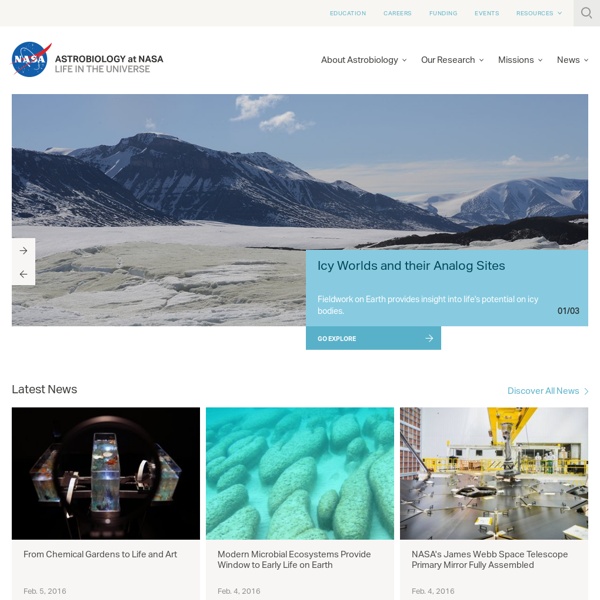



Astronomy Magazine - Interactive Star Charts, Planets, Meteors, Comets, Telescopes NOVA | Finding Life Beyond Earth PBS Airdate: October 19, 2011 NARRATOR: Is Earth the only planet of its kind in the universe, or is there somewhere else like this out there? Is there life beyond Earth? The search for alien life is one of humankind's greatest technological challenges. And scientists are seeking new ways to find answers. JIM GREEN (Director, Planetary Science Division, NASA): We're pushing the boundary of information of where life can exist, past the earth and out into the solar system. NARRATOR: Leading the search are sophisticated telescopes that scan the sky and an armada of robotic probes exploring the outer reaches of our solar system, all revealing the planets, moons, asteroids and comets like never before. AMY MAINZER: We can go places and see things that there's no other way we could've ever seen. JIM GREEN: The pace of discovery, just in the last couple of years, is just mindboggling. NARRATOR: Finding Life Beyond Earth, up now on NOVA. NARRATOR: But what exactly is this liquid?
Why the USA and NASA need astrobiology I am an astrobiologist, for 50 years an astronomer, and before that a physicist. With my colleague and friend Roger Angel, we started the process of learning how to detect Earth-like planets in 1985. I am a co-author of the NASA booklet The Terrestrial Planet Finder. I have served with scientific and technical teams to develop that mission since 1995. I have been a professor of astronomy at U. As a professional who has moved my research area around many times, I have both been depressed and concerned about the difficulty my colleagues have in pulling together material that crosses many fields. There are many complex issues that face our country and our world today. The first activity of my Astrobiology team was to hold a graduate student conference. Last year the NASA Astrobiology Institute held an internal meeting to explore the range of research of Institute members. Neville J. Professor of Astronomy Director LAPLACE
SolStation.com Astrobiology Center The Columbia Astrobiology Center (NYC-Astrobiology Consortium) The Columbia Astrobiology* Center represents a unique consortium of Columbia University departments, the Goddard Institute for Space Studies (NASA), and the American Museum of Natural History. It is an interdisciplinary effort dedicated to investigating the wide range of phenomena that may participate in the origin and evolution of life on Earth and beyond. We undertake fundamental research in many areas, including: The study and modeling of exoplanets, their characteristics and climates. The study of planet formation and solar system meteoritics and early chemistry.The study of Earth and Martian paleoclimate. The potential habitability of moons around giant planets. *"Astrobiology: The study of the origins, evolution, and future, of life in the Universe"
Seth MacFarlane Champions New ‘Cosmos’ Series on Fox Photo WASHINGTON — When some of the nation’s brightest minds gathered here at the Library of Congress to celebrate Carl Sagan, the pioneering astrobiologist, the first guest speaker was someone with no professional background in science. It was Seth MacFarlane, the multitasking comedian and creator of “Family Guy,” who gave an impassioned speech to the crowd of Ph.D.s and NASA advisers on how scientific achievement had “ceased in many parts of this country to be a source of pride.” “Long accepted scientific truths have been brought into question largely — who are we kidding? Now he is taking another step beyond his reputation as a purveyor of coarse humor, as an executive producer and prime mover of a resurrected version of “Cosmos,” the immensely popular documentary series that Sagan helped create and hosted for PBS in 1980. Mr. “ ‘Cosmos’ addressed questions that every human being has, whether they think about them on a mathematical level or just as a layman,” Mr. Yet for Mr. Ms. Ms.
Interactive 3D model of Solar System Planets and Night Sky Future Space-based Habitats TERC Astrobiology Astronomy Picture of the Day Discover the cosmos! Each day a different image or photograph of our fascinating universe is featured, along with a brief explanation written by a professional astronomer. 2016 April 15 Mercury and Crescent Moon Set Image Credit & Copyright: Miguel Claro (TWAN, Dark Sky Alqueva) Explanation: Innermost planet Mercury and a thin crescent Moon are never found far from the Sun in planet Earth's skies. Tomorrow's picture: Heliopause Electrostatic Rapid Transit System Authors & editors: Robert Nemiroff (MTU) & Jerry Bonnell (UMCP)NASA Official: Phillip Newman Specific rights apply.NASA Web Privacy Policy and Important NoticesA service of:ASD at NASA / GSFC& Michigan Tech.
Colonization of the Moon 1986 artist concept The colonization of the Moon is the proposed establishment of permanent human communities or robot industries[1] on the Moon. Recent indication that water might be present in noteworthy quantities at the lunar poles has renewed interest in the Moon. Permanent human habitation on a planetary body other than the Earth is one of science fiction's most prevalent themes. Proposals[edit] Concept art from NASA showing astronauts entering a lunar outpost The notion of siting a colony on the Moon originated before the Space Age. In 1954, science-fiction author Arthur C. In 1959, John S. Project Horizon[edit] Project Horizon was a 1959 study regarding the United States Army's plan to establish a fort on the Moon by 1967.[10] Heinz-Hermann Koelle, a German rocket engineer of the Army Ballistic Missile Agency (ABMA) led the Project Horizon study. Lunex Project[edit] Lunex Project was a US Air Force plan for a manned lunar landing prior to the Apollo Program in 1961.